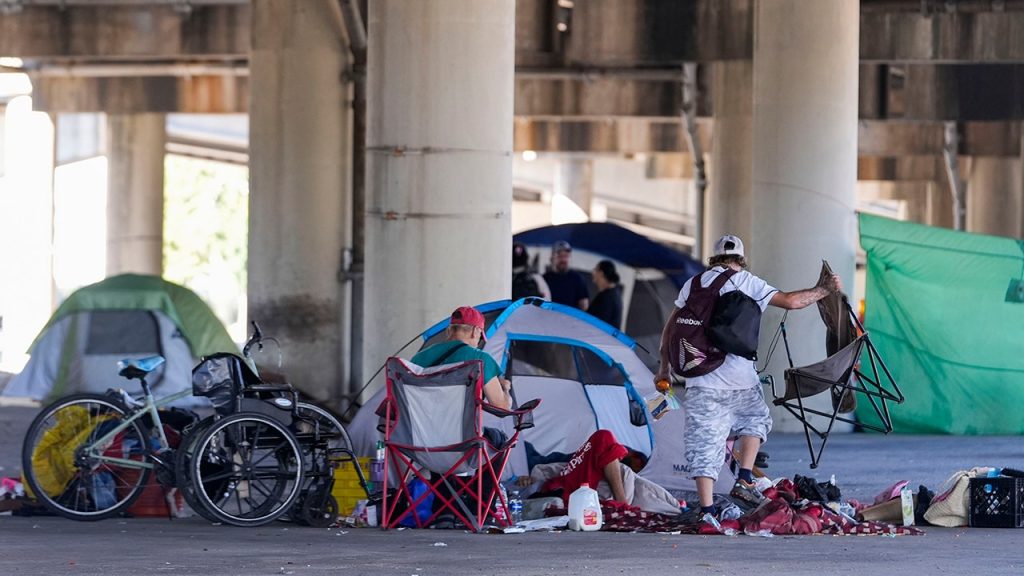The triple homicide at a secluded Louisiana homeless encampment in April 2024, allegedly stemming from a stolen bicycle, underscores the escalating dangers these encampments present not only to their residents but also to the surrounding communities. The victims, Mindy Ann Robert, Marcey Vincent, and Warren Fairley, were found shot multiple times, highlighting the vulnerability of individuals living in these often-unregulated spaces. This tragic incident coincides with a concerning national trend: an 18.1% increase in homelessness in 2024, as reported by the U.S. Department of Housing and Urban Development, attributed to factors such as a surge in asylum seekers, a scarcity of affordable housing, and the devastating impact of natural disasters.
Mark Powell, a former reserve police officer and school board member who oversaw the Monarch School for Homeless Youth in San Diego, emphasizes the dual threat these encampments pose: a health risk and a safety hazard to the public. He argues that city leaders and elected officials have a fundamental responsibility to dismantle these camps and provide inhabitants with dignified shelter options. This perspective underscores the complex interplay between public safety concerns and the need for compassionate solutions to address homelessness. The lack of regulation and oversight in many encampments creates an environment conducive to criminal activity, placing both residents and the broader community at risk.
In the Louisiana case, the alleged perpetrator, Noel Marine, was known to frequent the campsite. He was arrested and charged with three counts of first-degree murder and obstruction of justice. The victims, Vincent and Robert, were reportedly homeless and resided at the encampment, while Fairley lived in a nearby home. This detail suggests that the encampment’s influence extended beyond its immediate residents, affecting individuals in the surrounding area. Robert’s family’s belief that she was living in the area due to seeing her panhandling nearby adds another layer to the tragedy, illustrating the complex circumstances that often lead to homelessness and the difficulty families face in maintaining contact with loved ones living on the streets.
The investigation into the triple homicide revealed a complex web of circumstances. A man dating one of the victims discovered the bodies and alerted authorities. Marine’s fingerprint on a chair at the scene linked him to the crime. His prior criminal record, including drug convictions, placed his fingerprints in the national database. Furthermore, he was wanted for failing to appear in court on a misdemeanor theft charge related to an incident at Walmart earlier that year. The confluence of these factors painted a picture of an individual entangled in a cycle of criminal activity, further highlighting the challenges associated with managing and regulating homeless encampments.
Marine’s attempts to deflect responsibility for the murders added another layer of complexity to the case. He initially claimed to have been at a friend’s house at the time of the shootings, an alibi quickly debunked by the friend. Later, he accused another man of committing the murders, claiming he was retrieving a stolen bicycle from this individual when the shooting occurred. This shifting narrative, coupled with the lack of corroborating evidence or additional arrests, casts doubt on Marine’s claims and underscores the difficulties investigators face in piecing together events in such environments.
This incident exemplifies the broader societal debate on how to address the complex issue of homelessness. Powell argues that the government has a duty to regulate homeless encampments to ensure the safety of both residents and the surrounding community. He advocates for increased police presence, regular cleaning, and greater oversight to mitigate the risks of crime, drug use, and violence that often plague these unregulated spaces. He points out that the fear of crime associated with encampments can negatively impact the quality of life for nearby residents, restricting their use of public spaces and creating a sense of insecurity.
The Louisiana triple homicide serves as a stark reminder of the challenges associated with homelessness and the urgent need for effective solutions. The incident underscores the vulnerability of individuals living in encampments, the potential for violence and criminal activity, and the impact on surrounding communities. It highlights the complex interplay of factors contributing to homelessness, including lack of affordable housing, mental health issues, substance abuse, and systemic challenges. While law enforcement and security measures can play a role in mitigating immediate risks, addressing the root causes of homelessness requires a comprehensive approach involving social services, housing initiatives, and community support. The tragedy in Louisiana underscores the urgent need for a compassionate and effective response to the growing crisis of homelessness in the United States.

